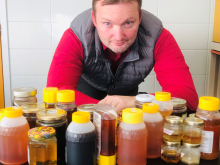McGill researchers have demonstrated something long assumed: that glances can transmit information about one’s mental state to others without a single word being exchanged. They speculate that this primal ability may have played a role in assuring survival of human society at times when making a sound could have attracted predators.


In a preclinical study led by McGill University researchers, two drugs targeting “zombie cells” have been shown to treat the underlying cause of chronic low back pain. The condition affects millions of people worldwide.
Current treatments manage symptoms through painkillers or surgery, without addressing the root cause.

McGill University researchers have developed an AI-powered method to verify the origin of honey, ensuring that what’s on the label matches what’s in the jar. The breakthrough offers a potential solution to a long-standing problem.
“Honey is one of the most fraud-prone commodities in global trade. It often involves mislabelling where it was produced or the types of flowers that bees collected nectar from,” said lead author Stéphane Bayen, Associate Professor and Chair of McGill’s Department of Food Science and Agricultural Chemistry.

A new study from McGill University is reshaping how scientists date dinosaur fossils in Alberta’s Dinosaur Provincial Park (DPP). Using advanced drone-assisted 3D mapping, researchers have uncovered significant variations in a key geological marker, challenging long-standing methods of determining the ages of dinosaur fossils.

A McGill University-led study found that people with cannabis use disorder (CUD) had elevated dopamine levels in a brain region associated with psychosis.
“This could help explain why cannabis use increases the risk of hallucinations and delusions, key symptoms of schizophrenia and other psychotic disorders,” said first author Jessica Ahrens, a PhD student in McGill’s Integrated Program in Neuroscience.

A new study by McGill University researchers yields insights into how the disruption of calcium transport in the brain is linked to autism and intellectual disability. The findings, published in the journal Nature, not only upend a long-held belief among neuroscientists, but could pave the way for treatments.

New research findings provide solid evidence that annual COVID-19 vaccine booster doses continue to be advisable for certain immunocompromised people, researchers at McGill University say.

A new study led by McGill University researchers indicates that humpback whales in the southeastern Pacific combine real-time environmental cues with their memories of conditions in their Antarctic feeding grounds to determine when to embark on their annual 10,000-kilometre journey. With climate change accelerating, the researchers warn this strategy may become less effective amid shifting ocean conditions.

An analysis of digital health records using large language models (LLMs) is challenging a long-held belief about the clinical identifiers of autism.
A new study led by researchers at The Neuro (Montreal Neurological Institute-Hospital) of McGill University and Mila Quebec AI Institute found that social communication factors may not be as important in identifying the condition as previously believed.

A new discovery about the slime ejected by velvet worms could revolutionize sustainable material design, according to a study by McGill University researchers. Their findings outline how a naturally occurring protein structure, conserved across species from Australia, Singapore and Barbados over nearly 400 million years of evolution, enables the slime’s transformation from liquid to fibre and back again. It’s a discovery that could inspire next-generation recyclable bioplastics.

A new method of tracking the dietary habits and contaminant exposure of animals in Arctic marine ecosystems is providing critical insights as climate change reshapes the region's food web.

A new study from McGill University researchers suggests the use of artificial intelligence (AI) to rapidly analyze vast amounts of biodiversity data could revolutionize conservation efforts by enabling scientists and policymakers to make better-informed decisions.

For people with a certain sleep disorder, a simple blood test could help predict the development of dementia years before symptoms appear, a new study indicates.

Electronic devices rely on materials whose electrical properties change with temperature, making them less stable in extreme conditions. A discovery by McGill University researchers that challenges conventional wisdom in physics suggests that bismuth, a metal, could serve as the foundation for highly stable electronic components.
The researchers observed a mysterious electrical effect in ultra-thin bismuth that remains unchanged across a wide temperature range, from near absolute zero (-273°C) to room temperature.

A McGill-led team of researchers has gained insight into how parents of colour in the United States approach discussions with their children aimed at teaching them the skills they need to survive and thrive in a racially unequal society.
A key finding of the recent paper in Developmental Psychology is that parents are especially in need of information, support and guidance when it comes to preparing their children to face discrimination and bias.
